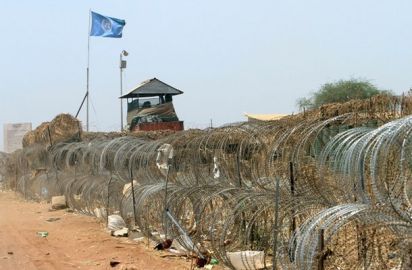UNSC renews UNISFA mandate in Abyei
November 17, 2012 (WASHINGTON) – The United Nations Security Council (UNSC) on Friday has renewed the mandate of the UN Interim Security Force for Abyei (UNISFA), for additional six months until May 2013.

The Council also welcomed the redeployment of Sudanese military and South Sudanese military and police personnel from the Abyei area in compliance with resolution 2046, and demands that the Government of Sudan redeploy the oil police in Diffra from the Abyei area immediately and without preconditions.
Members of the UNSC, also reiterated, that Abyei area shall be demilitarized from any forces other than UNISFA and the Abyei Police Service, in accordance with its resolutions 1990 and 2046.
The UNSC, in its resolution, also demanded that Sudan and South Sudan urgently finalize the establishment of the Abyei area Administration and Council, including by resolving the deadlock over the Chairmanship of the Council, and constitute the Abyei Police Service.
Sudanese and South Sudanese representatives who attended the meeting were keen to spell out the positions of their respective governments over a recent decision taken by the AU Peace and Security Council to organise a referendum in Abyei next year if they fail to reach a compromise.
Daffa-Alla Elhag Ali Osman, Sudan’s representative to the UN, reassured the Security Council of his government’s commitment to work with its South Sudan counterpart to reach a “satisfactory” settlement of the situation in Abyei.
He however warned that the imposition of any “cohesive or “unilateral” settlement that does not take into the sensitivity of the population growth in Abyei will not achieve peace and stability in the region.
South Sudan’s deputy head of mission, Francis Nazario, at the meeting said dissolving the final status is a “crucial” component for lasting peace and stability in the region.
He said the Government of South Sudan welcomes the UNSC’s decision to renew UNISFA’s mandate, which he described as “effective” promoters of peace in the disputed oil-producing area.
The short meeting meant to focus mainly on the renewal of the UNISFA mandate and left a side other issues related to the security situation in the areas, despite recent death of a local staff member and the tensions raised by the AUPSC decisions between the two sides.
Nonetheless, the representative from Pakistan lauded the decision taken by the political leadership of the two countries, which led to the signing of a number of agreements on several contentious issues.
However, although he recognized the role of the African Union through its High Level Implementation Panel on Sudan, the Pakistani ambassador urged the UNSC to play a “constructive” and “balanced” role.
“It is important that this Council remains consistent in its support for the decisions of African Union with regard to the situation between Sudan and South Sudan. Selective response of this Council to the AU decision can undermine peaceful resolutions of outstanding issues between Sudan and South Sudan,” he said.
The resolution, he added, should also have referred to the AU Peace and Security (AUPSC) communiqué on 3 August, which he described as essential part of decisions by the AU on issues between the two countries.
The AUPSC communiqué, adopted at its 329th meeting, commended UNISFA for its effectiveness in providing security in Abyei, which has enabled the displaced communities to begin to return, and the seasonal migration of pastoralist communities to conclude peacefully.
The AU, during its meeting also, called on the Abyei Joint Oversight Committee (AJOC) speedily to finalize the establishment of the Abyei Police Service, to enable it to take over policing functions throughout the Abyei Area, including the protection of the oil infrastructure.
(ST).
